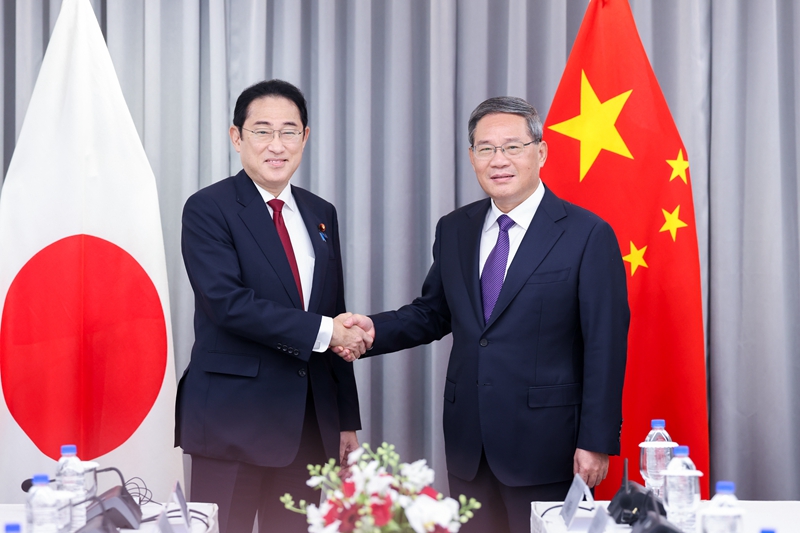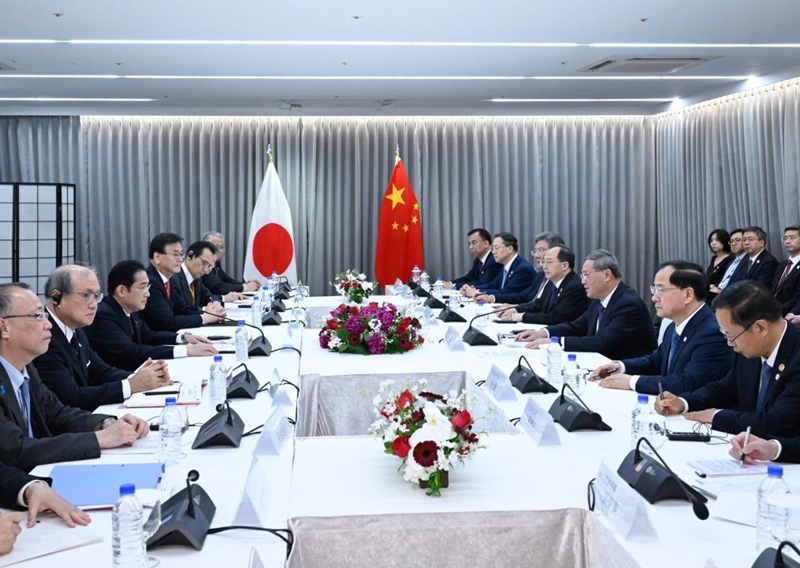
SEOUL, May 26 -- Chinese Premier Li Qiang on Sunday called on Japan to work with China in the same direction and implement the important consensus reached by the leaders of the two countries.
It is hoped that the two countries will continuously consolidate mutual trust, deepen cooperation, properly manage differences, and build a constructive and stable China-Japan relationship that meets the requirements of the new era, Li said during his meeting with Japanese Prime Minister Fumio Kishida on the sidelines of the ninth Trilateral Summit Meeting among China, Japan and South Korea.
Li said that last November, Chinese President Xi Jinping and Prime Minister Kishida met in San Francisco, reached important consensus, and reaffirmed the positioning of comprehensively advancing the strategic and mutually beneficial relations between China and Japan, providing important political guidance for the development of bilateral relations.
History and Taiwan are major issues of principle concerning the political foundation of China-Japan relations, as well as basic issues of faith and integrity, and the Taiwan question is at the core of China's core interests and a red line, he said.
It is hoped that Japan will honor its promise and create a positive atmosphere for the continuous development of bilateral relations, said Li.
The development of China and Japan is an important opportunity for each other, and the Chinese and Japanese economies are now closely intertwined, bringing tangible benefits to the two peoples, he said.
The economic complementarity between China and Japan will exist for a long time to come, and there is huge potential for cooperation in scientific and technological innovation, digital economy, green development and exploring the third markets, he added.
China and Japan should help each other succeed, jointly maintain a stable and unimpeded industrial chain and supply chain, and safeguard the global free trade system, he said.
China is willing to continue to carry out friendly exchanges with Japan in various fields, through various channels and at various levels, further facilitate people-to-people exchanges and actively carry out youth exchanges, so as to consolidate public support for China-Japan friendly cooperation, Li said.
The release of the Fukushima nuclear-contaminated wastewater bears on the health of humanity, the global marine environment and international public interests, Li said.
Noting that China is a major stakeholder, and the Chinese government and people are highly concerned about the issue, Li said China hopes Japan will further demonstrate sincerity and constructive attitude toward such issues as long-term international monitoring arrangements, seriously address legitimate concerns both at home and abroad, and earnestly fulfill its responsibilities and obligations.
For his part, Kishida said maintaining a sound development momentum of Japan-China relations is not only conducive to both countries, but also beneficial to the world.
Japan stands ready to work with China to implement the important consensus reached by the leaders of the two countries, maintain high-level exchanges, strengthen cooperation in such fields as green economy, medical care and third-party markets, facilitate personnel exchanges, deepen regional cooperation, and jointly tackle climate change and other global issues, Kishida said.
Japan is also willing to actively build constructive and stable Japan-China relations, comprehensively advance the strategic and mutually beneficial relations between Japan and China, and promote the sound and long-term development of bilateral relations, he noted.
Japan adheres to its position on the Taiwan question as stated in the Japan-China Joint Statement signed in 1972, which remains unchanged, Kishida said.
The two sides agreed to strengthen dialogue and communication at all levels, hold a new round of China-Japan high-level economic dialogue and high-level people-to-people and cultural exchange consultation mechanism meetings at an appropriate time, continue to promote consultations and dialogues on the release of Fukushima nuclear-contaminated water on the basis of existing progress, and maintain communication and coordination on international and regional affairs.
The two sides also exchanged views on international and regional issues of common concern.
